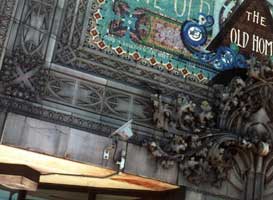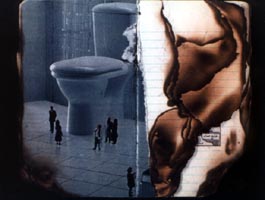|
Photographie
und jenseits
Drei Filme von Heinz Emigholz |
Heinz
Emigholz
|
| Photography and beyond |
Deutschland
1983-2000
|
 |
 |
| Delphi-Filmpalast 09.02 14.00 CinemaxX 3 10.02 18.15 CineStar 8 10.02 14.00 Kino Arsenal 11.02 10.00 |
| Produktion: Heinz Emigholz/Pym
Films Weltvertrieb: Pym Films Postfach 63 01 11, 10266 Berlin Tel.: (49-30) 554 90386, Fax: 554 90396 Zeichnungen, Kamera, Schnitt: HeinzEmigholz Mitarbeit: Ueli Etter, Andreas Senn,Thomas Wilk Tonbearbeitung: Martin Langenbach, Heiner Büld Format: 35mm, 1:1.37, Farbe, 25 Bilder/Sek. Länge: 38 Minuten (Sullivans Banken) Länge: 48 Minuten (The Basis of Make-Up II) Länge: 24 Minuten (Maillarts Brücken) |
| Thema der drei Filme sind aktive Gestaltungs- und Projektionsleistungen
– real gewordene Vorstellungen – sichtbar als Schrift, Zeichnung,
Photographie, Architektur und Skulptur. Analysiert wird ein quasi
umgedrehter Sehvorgang – Sehen als Ausdruck, nicht als Eindruck.
Das Auge als Schnittstelle zwischen Gehirn und Außenwelt, der
Blick eine komponierende Kraft, die ein Inneres nach außen stülpt
und in der Realität gespiegelt vorführt. Aus dokumentierten
und animierten Notizheften und Skizzenbüchern, durch filmische
Analysen von Architekturen und Skulpturen bildet sich etwas Unbeschreibbares:
ein Film über die Objektivierung gedanklicher Vorstellungen. Sullivans Banken Schriften und Bauten von Louis H. Sullivan zeichneten entscheidende Positionen der Moderne vor, auch ihre Janusköpfigkeit. Seine zur modernen Bauweise parallel gedachte und gestaltete organische Ornamentierung wurde in Deutschland kaum wahrgenommen. The Basis of Make-Up (II) Basisfilm und Mastertape zu den Spielfilmen Der Zynische Körper, No Safe Haven und Schwarzer Hafen. Darsteller sind 69 bebilderte Notizbücher von Heinz Emigholz aus den Jahren 1983 bis 1996, drei Skizzenbücher aus den 80er und 90er Jahren und zahlreiche filmische Studien. Maillarts Brücken Der Schweizer Bauingenieur Robert Maillart revolutionierte die Stahlbetonbauweise und realisierte mit seiner Reduktion des Materials auf die tragenden Teile und deren Neugestaltung in seinen Bauwerken eine bis dahin unbekannte Formenwelt. |
The three films focus on works of active creation or
projection – ideas made real – visible as writing, drawings,
photographs, architecture and sculpture. They analyse what is in effect
an inverted visual process: vision as expression, not impression.
The eye is the interface between the brain and the outside world,
vision a composing force which turns what is inside outwards and projects
it as a mirror image of reality. Documented and animated notebooks
and sketchbooks, cinematic analyses of architecture and sculpture
together form something indescribable: a film about the objectification
of imagined ideas. Sullivan’s Banks Louis H. Sullivan’s writings and constructions set out central positions of modernism, including its ambiguity. His organic ornamentation, conceived and created in conjunction with modern methods of construction, was barely noticed in Germany. Europeans did not consider Sullivan to be of interest as a theoretician, even though he was Frank Lloyd Wright’s teacher. The Basis of Make-up (II) Drawings and writings. This is both the original film and master tape of the feature films The Cynical Body, No Safe Haven and Black Harbour. The protagonists are 69 illustrated Heinz Emigholz notebooks from the years 1983 to 1996; three sketchbooks from the 1980’s and 1990’s; and several cinematic studies. Maillart’s Bridges Robert Maillart revolutionised concrete-based construction. By reducing the material to the essential load-bearing elements and redesigning these in his structures, he developed a completely novel world of forms. |
| Heinz Emigholz, geb. 1948. Seit 1973 als Filmemacher, bildender Künstler, Kameramann, Schauspieler, Autor, Publizist und Produzent tätig. Filme im Forum u.a. Hotel (1976), Normalsatz (1982), Der Zynische Körper (1991). |